While India houses some of the best medical and law colleges, it also houses the National Defence Academy. The National Defence Academy (NDA), Pune is the first and the largest tri-service academy in the world. It serves as the joint services academy of the Indian Armed Forces. The cadets receive training here together before they go to their respective service academies for the promoted pre-commission training.
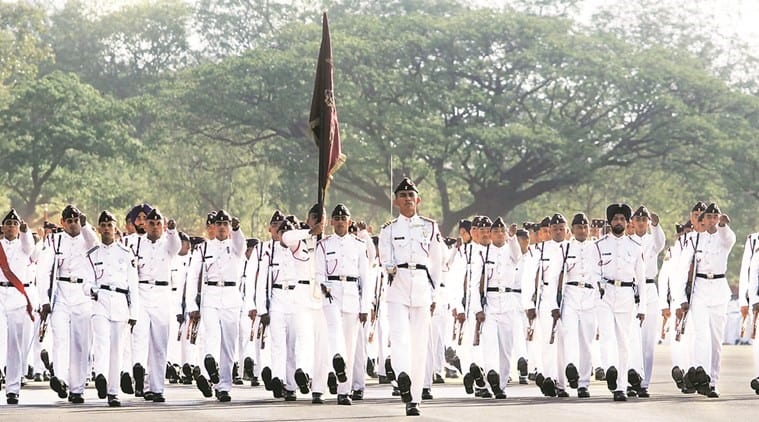
Motto: सेवा परमो धर्मः (Service Before Self)
Type: Military Academy
Established: 7 December 1954
Commandant: Lt. Gen. Asit Mistry
Location: Khadakwasla, Pune, Maharashtra, India
Campus: Urban
Affiliation: Jawaharlal Nehru University
Website: www.nda.nic.in
Campus:
The NDA campus covers 7,015 acres of land in Pune, near the Khadakwasla Lake. The location was chosen on the basis of its closeness to the Arabian Sea and other military establishments like an operational airbase nearby at Lohegaon as well as a healthy climate. It stands on the hunting grounds of Chhatrapati Shivaji Maharaj, with the Sinhagad Fort in view. The presence of an old combined-forces training centre and a mock landing ship, HMS Angostura, used to train troops for amphibious landings served as another reason for it being chosen.
The administrative headquarters of the National Defence Academy is named the Sudan Block. It was named so in honour of the sacrifices the Indian soldiers made in the Sudan theatre during the East African Campaign. It is a three-storey building whose architecture features an exterior design comprising a blend of arches, pillars and verandahs, topped by a dome. The campus also houses the Habibullah Museum.
The NDA is excellently structured for the all-round training of cadets and provides all sorts of facilities like spacious and well-equipped classrooms and laboratories, two large swimming pools, a gymnasium, 32 football fields, 2 polo grounds, a cricket stadium and numerous squash and tennis courts.
NDA Mess:
The Cadets’ Mess is the largest canteen in Asia and can cater to 1800 cadets at the same time. It is one such place at the NDA which inculcates in them the sense of brotherhood and solidarity. The staff in the mess are trained accordingly to serve meals to the cadets within the stipulated time. The mess also has a grand piano of German origin.
Admission to the National Defence Academy:
The academy selects students on the basis of a series of written exams and interviews. The candidates applying for the exam firstly appear for a written exam which is conducted by the Union Public Service Commission (UPSC). After qualifying the written exam, the selected candidates have to go through a number of extensive interviews by the Services Selection Board (SSB). These tests cover general aptitude, psychological testing, team skills, and physical and social skills in the candidates, along with medical tests.
The exam takes place twice a year, in the months of April and September. More than 4,50,000 candidates apply for the written exam every year. Out of them, around 6,300 qualify for the interview round. Less than 500 students qualify to join the NDA. The minimum age of the applicant must be 16 and a half years and the maximum age is 19 and a half years.
Applicants joining the Air Force through the flying branch go through a test called the Computerized Pilot Selection System (CPSS).
Cadets who join the academy and successfully complete their program go to their respective training academies for one year of training before their grant of commission. The army cadets gp to the Indian Military Academy (IMA) at Dehradun. While the air force cadets to the Air Force Academy (AFA) at Dundigal, Hyderabad. The naval cadets are to the Indian Naval Academy (INA) at Ezhimala, Kerala.
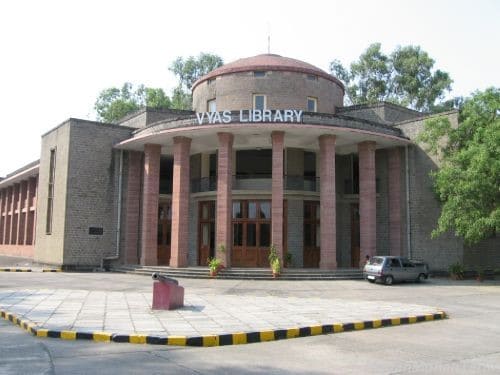
Curriculum:
The NDA offers a full-time, residential undergraduate program. The cadets get a Baccalaureate degree (a Bachelor of Arts or a Bachelor of Science) after 3 years of study. The academy is affiliated to the Jawaharlal Nehru University (JNU).
The cadets choose from one of the two streams. The Science stream comes with the subjects of Physics, Chemistry, Mathematics and Computer Science. The Humanities (Liberal Arts) stream comes with the subjects of History, Economics, Political Science, Geography and Languages.
The academic studies are split into three categories in both the streams: the compulsory course, the foundation course, and the optional course.
Compulsory Course
English, Foreign Languages (Arabic, Chinese, French or Russian), Physics, Chemistry, Mathematics, Computer Science, History, Political Science, Economics and Geography are the subjects that the cadets study. It is mandatory for all the cadets to take basic classes in all these subjects except Foreign Languages. They might later take advanced classes on the basis of their chosen stream.
Foundation Course
It is compulsory and includes Military Studies and General Studies. Students learn Military History, Military Geography, Weapons systems and Armaments, etc. in Military Studies. While they learn Geopolitics, Human Rights, Laws of Armed Conflict and Environmental Sciences in General Studies.
Optional Course
It offers subjects that are specific to the Service chosen by the cadet.
The first four semesters cover the Compulsory Course and the Foundation Course. Students learn the Optional Course during the fifth and sixth semesters. The cadets are free to transfer to other Service academies for the optional courses.
Recently, a four-year B.Tech. program has been introduced in NDA, for the branch of Applied Electronics and Communication. The first three years of which are covered in the NDA and the last year of the program is completed at the final academy of the cadet.
Training:
Apart from the academic counterpart, the cadets also learn outdoor skills such as drills, PT and games. The students learn horse-riding, swimming, rope climbing, rifle shooting and much more. The academy also conducts regular camps and trekking expeditions for the cadets. The cadets are assessed on the basis of their performance in these activities. The academy emphasizes character building and inculcating in the cadets, the sense of pride and mutual loyalty, mental and physical robustness, leadership, team spirit, discipline, constant self-improvement and a sense of keen observation.
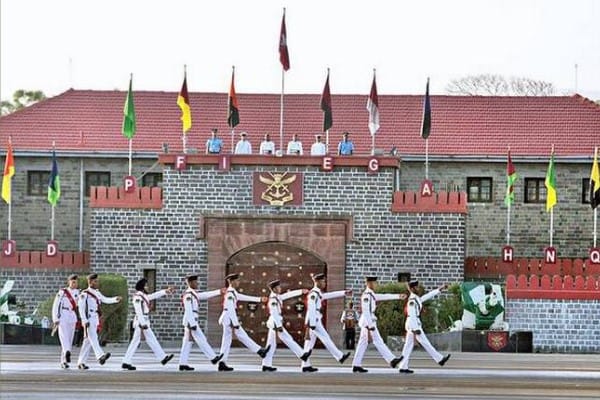
Squadrons and Battalions:
Each cadet at the academy is allotted to one of the eighteen Squadrons. The Squadrons include: Alpha, Bravo, Charlie, Delta, Echo, Foxtrot, Golf, Hunter, India, Juliet, Kilo, Lima, Mike, November, Oscar, Panther, Quebec and Romeo. The squadrons are further placed under one of the five Battalions. Battalion No.1, No.2, No.3 and No.4 include four squadrons each, while Battalion No.5 includes the last two squadrons. Each squadron houses approximately 100 cadets and comprises senior as well as junior courses under training in the academy. Each Squadron has a nickname of its own.
Every year, the best Squadron gets the prestigious Inter Squadron Championship Trophy during the passing out parade. In NDA, almost everything is a division among squadrons. Hence, each squadron has a unique history and culture of its own. The cadets learn to inculcate in them the spirit of brotherhood and discipline first in their squadrons itself. The squadrons are thus under continuous assessment throughout.
Uniform:
The National Defence Academy provides the cadets with all sorts of facilities by itself to maintain the decorum of uniformity among them. Each cadet gets a single cabin in his respective squadron and receives basic amenities.
The cadets at NDA also get around nine types of uniforms which they wear in accordance with the events at the academy. Despite that, the cadets have to put on the nightclothes and other such necessities provided by the NDA only.
Extracurricular Activities:
Cadets at NDA participate in various camps and events all throughout the year. Different camps and events are scheduled for different semesters. They cover all the requisite skills and training of the cadets. The cadets, as well as the squadrons, are assessed continuously on the basis of their performance in various aspects including discipline, scores in different sports activities, performances in different camps, team spirit and much more.
Passing Ceremony:
At the end of the sixth semester, the cadets pass out and set their journey for their destined academies according to their initial choice among the army, air force and navy. The passing out ceremony at NDA is a grand and notable gesture of the academy. The students graduating receive farewells from their juniors. Some weeks before the passing out parade, the academy organizes the traditional NDA Ball event. Here, the cadets are free to ask out girls in their proximity to be their ball partners at the event. Many competitions take place, all of which help the cadets in creating memories of their last days at the academy. Such events also give them a break from the tough schedule they follow throughout their stay at NDA.
Every year, on May 30, the grand Passing Out Parade takes place at the academy. The cadets perform their last parade in front of the chief guests, the administrative staff and their family. The best cadets and squadron of the batch get awarded in this ceremony.
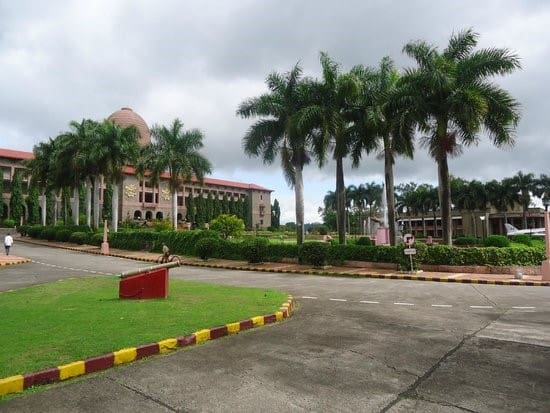
Alumni
The NDA has produced innumerable proud and capable defence personnel over the years. The alumni of the academy have led and fought in major combats that India has participated in. They have had an unbelievable record of receiving the highest number of gallantry awards in the country. They have served as the Chiefs and other major rank holders in all the three services all through these years.
About the author
An undergraduate in Economics at Ravenshaw University, Cuttack. Poems, people and stars fascinate me. Empathy and gratitude is what I look for, within and around me.

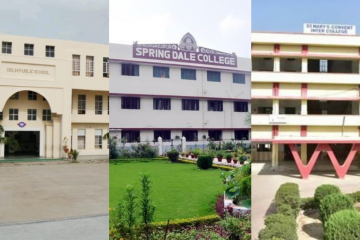
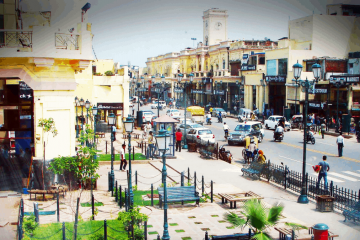
0 Comments